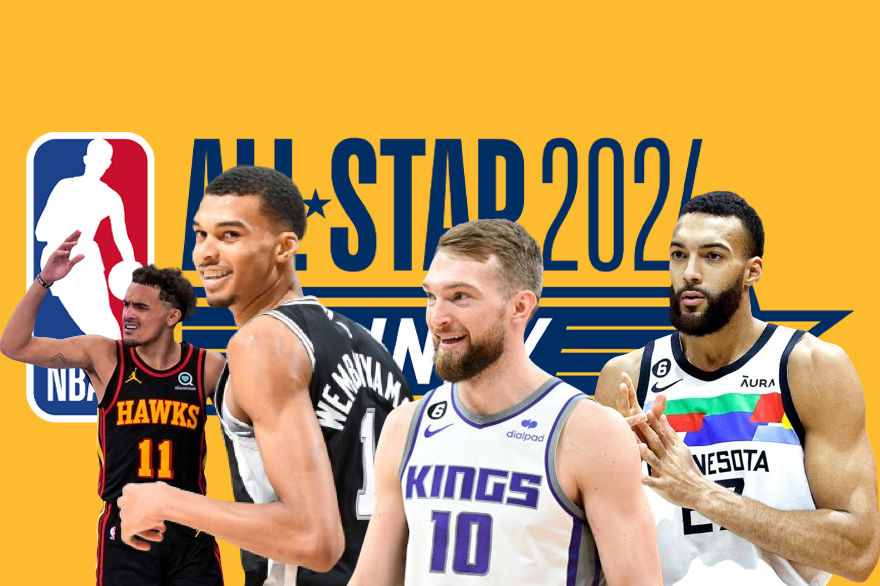Every NBA season, the announcement of All-Star rosters sparks a mix of excitement and debate among fans, players, and analysts. In the midst of cheers for those selected, there are also groans for perceived omissions — the All-Star snubs.
The term “snub” has become synonymous with players who, despite stellar individual performances, find themselves on the outside looking in when the star-studded lineups are unveiled.
To label a player as an All-Star snub is to assert that their individual contributions, statistics, and impact on the court should have merited inclusion in the All-Star lineups. It’s a designation that, by its very nature, implies a sense of injustice or oversight, as fans and pundits argue that certain players have been unfairly left out of the midseason showcase of the league’s best talent.
The process of All-Star selection is a complex interplay of statistical achievements and team success. While the league has adopted a combination of fan, player, and media voting to determine the All-Star starters, coaches decide who is part of the reserves. the subjectivity inherent in these evaluations often leads to contentious decisions.
Individual performances, no matter how outstanding, sometimes take a backseat to other factors, creating an environment where players may be snubbed despite their exceptional contributions.
One of the primary sources of subjectivity in All-Star selections lies in the ongoing debate between valuing individual performances and prioritizing team success. While some argue that players on winning teams should receive preferential consideration, others emphasize that All-Star status should primarily reflect an individual’s impact on the game, irrespective of their team’s record.
The crux of the All-Star snub dilemma often boils down to the tug of war between raw statistical brilliance and the intangible contributions a player makes to team dynamics. A player averaging eye-popping numbers may still be overlooked if their team’s overall success is lacking, leading to a perennial debate over whether team achievements should be weighed more heavily than individual prowess in the All-Star selection process.
Either way, last night, the reserves for the 2024 NBA All-Star Game were announced and read as followed:
Eastern Conference Reserves:
- Jalen Brunson, New York Knicks
- Donovan Mitchell, Cleveland Cavaliers
- Jaylen Brown, Boston Celtics
- Bam Adebayo, Miami Heat
- Julius Randle, New York Knicks
- Tyrese Maxey, Philadelphia 76ers
- Paolo Banchero, Orlando Magic
Western Conference Reserves:
- Anthony Edwards, Minnesota Timberwolves
- Stephen Curry, Golden State Warriors
- Kawhi Leonard, Los Angeles Clippers
- Anthony Davis, Los Angeles Lakers
- Devin Booker, Phoenix Suns
- Paul George, Loss Angeles Clippers
- Karl-Anthony Towns, Minnesota Timberwolves
This brings us back to the beginning… SNUBS! While again, this is a mix of subjectiveness and approach, here are my ten biggest snubs ranked from 5 to 1:
Honorable mentions:
James Harden, Derrick White, Kristaps Porzingis, Jimmy Butler, Pascal Siakam, Chet Holmgren, Jamal Murray, De’Aaron Fox, Alperen Sengun, Scottie Barnes.
5: Lauri Markkanen
Aside from averaging 23.6 points and 8.7 rebounds on 50% from the field and 88% from the line, Utah has a point differential around that of a 47-win team when Markkanen is on the floor and one around that of a 17-win team when he’s off, according to Bleacher Report. His impact has been incredible and he’s proven to be a team’s best player over-and-over again.
4: Victor Wembanyama
Hey judge me… but this is my list. I don’t care that the Spurs are among the worst teams in the league. They have this 7’4″ guy averaging 24.2 points 9.3 rebounds, 3.4 assists and 3.4 blocks in just 26.4 minutes over his past 16 games. Oh, and did I mention he’s a rookie? Oh, and did I mention he’s causally dribbling like a guard. Oh, and did I mention his Shammgod? His posters? His blocks? He is a personified All-Star Game… that’s why he should have made the squad.
I guess, there’s always next year.
3: Rudy Gobert
Just a year ago, Gobert was seen as a joke after a disappointing season following the Wolves’ trade for him with five first-round picks. However, this season, Gobert is back in good health and his impact on Minnesota is undeniable. The best rim protection in the league and his rebounding have the Wolves own the best defense in the NBA. It’s not just about the shots he blocks, but also the shots opponents are too afraid to even attempt. When Gobert is on the floor, the team is +9.7 points per 100 possessions, compared to +1.2 when he’s off. With his impact alone, aside from his 13.4 points, 12.5 rebounds, and 2.1 blocks on 63.9% shooting, he should habe made the All-Star team.
2: Trae Young
Sure, the Atlanta Hawks are in the midst of yet another mediocre to subpar season. However, they still rank high enough to grant them a spot in the Play-In Tournament. Team Record aside, Trae Young has been on a tear this season, averaging 27 points, and 10.9 assists. This makes him only the second player in NBA History to average more than 25 points on 55+% TS, while dishing out more than 10 assists, to not make the All-Star Game.
The other player, you ask? Well, 2022-23 Trae Young! He may not be the most likable player, but come on… this is getting ridiculous.
1: Domantas Sabonis
When we talk about point-forwards, or point-centers, Sabonis often gets overlooked. But this season, Sacramento’s star player has been putting up impressive numbers. He’s currently averaging 19.9 points, a league-leading 13.0 rebounds, and a highly underrated 8.0 assists.
It’s worth noting that only three players in NBA history who are as tall as him (6’10”) or taller have surpassed that assist mark for an entire season: Nikola Jokić, Wilt Chamberlain, and Ben Simmons.
Oh, and if you’re a fan of team records, the Kings rank 5th in the ultra-competitive Western Conference, with a 27-19 record.
It’s about time to increase these All-Star Rosters to 15 in their respective conferences.


